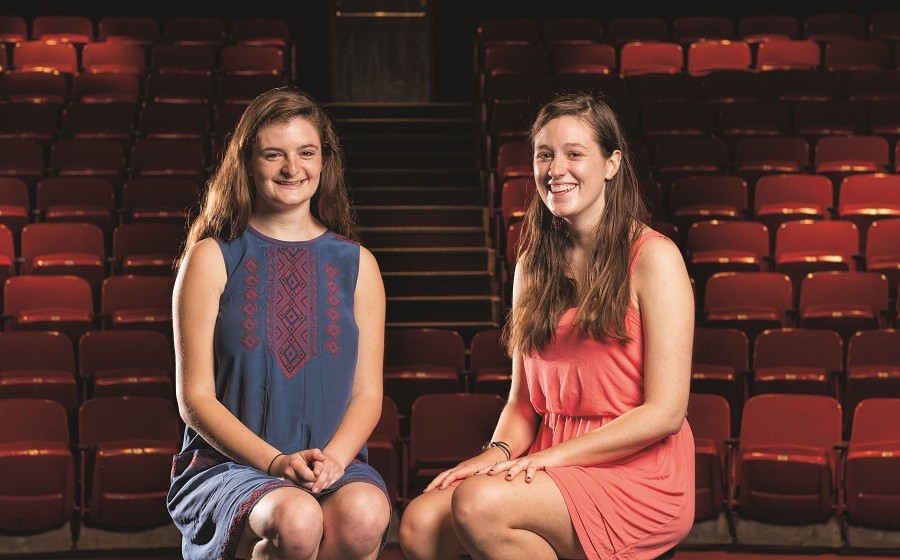Cookie Canvas
Patti Paige '74 turns sweets into artwork - including a miniature version of Rosse Hall in gingerbread.
Read The StoryTwo students resurrect a theater group that focuses on the underrepresented talents of women.

When Julia Greer ’15 and Emma Miller ’15 were first-years, the spring mainstage production was “Hamlet.” It struck them both that many of the plays produced at Kenyon — whether faculty- or student-driven — featured mostly male characters, were written by men and covered male-dominated themes.
“It’s a topical issue in the world, especially in Hollywood, across much of the arts,” Miller said. She and Greer, both drama majors who became fast friends, decided to start a group their sophomore year that focused on female talent in the theater.
It turns out they didn’t have to start from scratch. Annie Higby Ellsworth ’04, associate director of annual giving, told them about StageFemmes, a female theater group that had been popular when she was a student but had fizzled out not long after she graduated. After researching the group’s history and talking to alumnae who had been involved with it, Greer and Miller decided to revive it, taking on the original group’s name and general mission: “Feminist work without overtly feminist themes.”
“Our goal has been to showcase female writers, strong roles for women and issues that women deal with without hitting you over the head with feminism or alienating people because of the themes,” Miller said.
They started by putting on Postgrad, a musical by Beth Hyland ’13, a senior at the time, about three women working as unpaid interns in New York City after graduating from a liberal arts college. They enlisted the help of students who had played in bands, but never acted.
“It was a really fun kickoff because it sort of took us outside of the people who are always auditioning, people who are always involved,” Greer said. “And it was exciting to see this full musical by a girl who was a senior and to show what StageFemmes is about.” The production was a success, drawing in hundreds of viewers each night.
From there, Greer and Miller worked to put on more plays in a variety of genres — How I Learned to Drive by Paula Vogel and Dry Land by Ruby Rae Spiegel — often making use of nontraditional theater spaces, which were easier to book than campus theaters. When StageFemmes produced a series of one-acts written by alumni, for example, one took place in a hotel room, so the actors performed at the Kenyon Inn.
They set up a library of female-written plays in their StageFemmes-themed house their junior year to encourage students to consider those works for scenes in their acting classes or as their senior thesis productions. During their final semester at Kenyon, they partnered with film and TV producer Megan Wolpert Dobkin ’95 as she workshopped her play Pink Boxes, culminating in a reading in April.
“They’re amazing young producers,” said Wendy MacLeod ’81 P’15 ’17, the James Michael Playwright-in-Residence and professor of drama, who served as faculty advisor for both iterations of StageFemmes.
Ellsworth thinks the original StageFemmes, which was active from the early-90s to the mid-2000s, faded, in part, because other theater groups, such as Renegade for first-year students and Brave Potato Productions specializing in musicals, popped up. But MacLeod says it was lack of good student direction that led to the group’s unraveling. “It requires somebody who’s willing to be the leader. It takes a lot of work,” she said. “Julia and Emma were willing to do the work.”
Another element that made the group so successful was its inclusiveness. Plays they produced were open to everyone, including non-drama majors and men. “They didn’t exclude anybody from it,” Ellsworth said. “It was an opportunity for anyone to be involved.”
Greer and Miller say they believe the group will continue even though they’ve moved on from Kenyon. Greer is a producing intern at the Powerhouse Theater Festival at Vassar College, and Miller is the assistant director of a performing arts day camp in Cleveland. “There are really phenomenal sophomores and juniors and freshmen who have worked with us — some who’ve been involved from the company’s earliest stages — who will take it on,” Miller said.
Ultimately, they hope to use their positive experience in reviving StageFemmes to form a theater company together in Chicago. Miller said, “We’d like to use what we learned here on kind of a miniature level and try to do it for real.”
Patti Paige '74 turns sweets into artwork - including a miniature version of Rosse Hall in gingerbread.
Read The StoryDuring the golden age of illustration, Coles Phillips, Class of 1905, conjured a vision of American womanhood…
Read The StoryThe College's strategic plan is more than a play on perfect vision. It's the future. And it starts now.
Read The StoryCity papers are dying and you can't always trust the Internet, but Kenyon journalists embrace the challenge of…
Read The Story